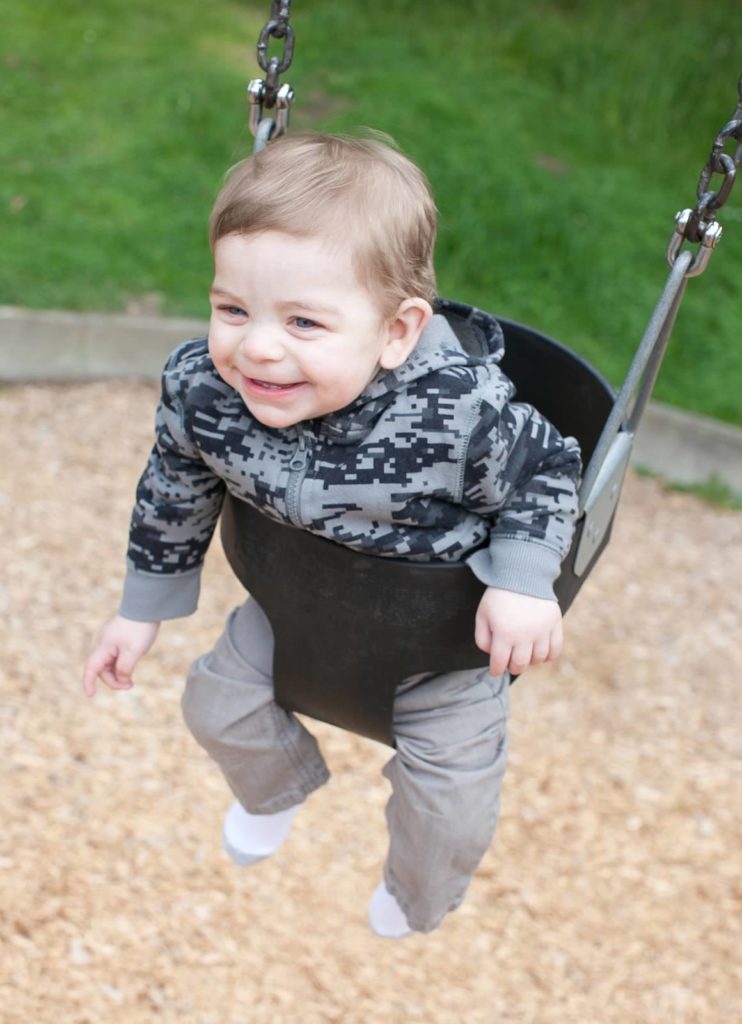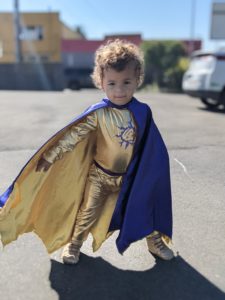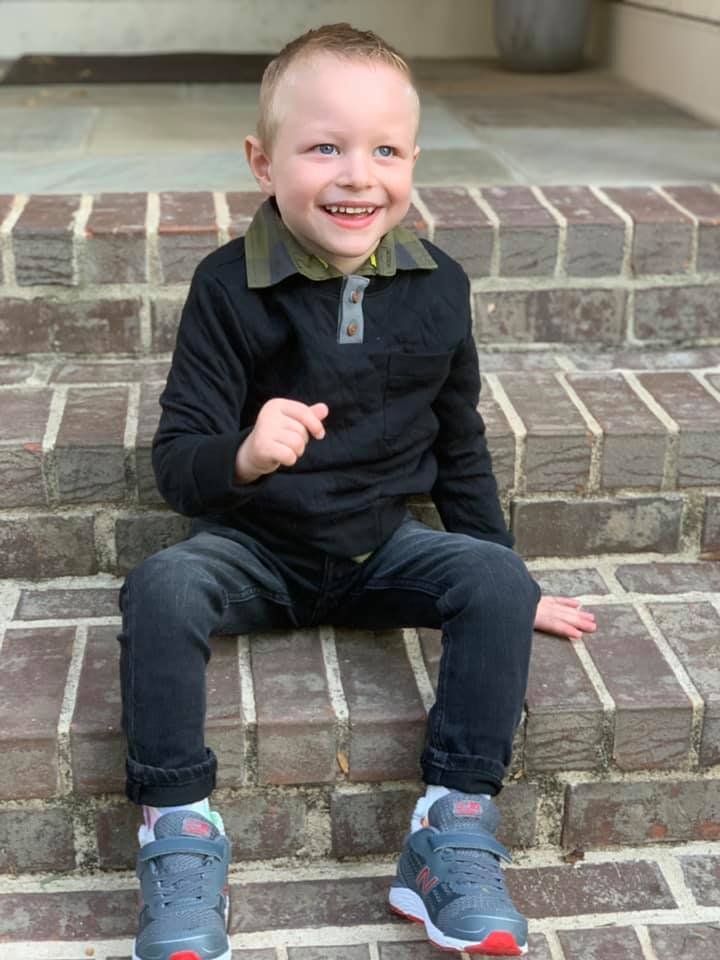Meet Jackson — Perinatal Stroke
Like most of you, my husband Nick and I were not aware that a stroke could happen in a child, much less an infant, until it happened to our son Jackson. By all accounts, he was perfect when he made his way into the world in 2012. He had all his fingers and toes and even received high Apgar scores. Although exhausting, our stay in the hospital was uneventful; however six hours after bringing him home he awoke screaming and inconsolable. After some time, he quieted down but appeared to stare off in a daze, something even us first time parents found unusual. For an hour he continued to stare and refused to eat and Nick and I just knew we had to return to the hospital.
It took over an hour of waiting in an ER room to finally be seen by a nurse who began to take his vitals. When Jackson’s glucose levels read less than 20, the batteries in the device were changed given the low number and his level was taken again, still with no change. We were asked to try to feed him while we waited for the on-call pediatrician to arrive. We would later find out that this is when the ER contacted the Pediatric ICU to ready a bed, but it would be 8 more hours until we made it to that floor.
Since Jackson refused to eat, we were admitted to the pediatric floor where a head IV and an NG tube were placed in an effort to keep him hydrated and raise his blood sugar. Eventually we were brought to our own room where they could monitor Jackson. For the next 8 hours, he seemed to do well but any sense of relief I had gained over than time vanished when I looked over at him in the crib and he was blue. Immediately the monitors began to alarm and Nick ran out into the hallway to find a nurse while I contemplated giving him CPR, as I was unable to figure out how to use Oxygen device. A nurse ran in and provided him with assistance, returning his oxygen levels to 100% but not 5 minutes later it dropped back down to 60 and again Nick was out in the hallway looking for help. And from that point on, we watched his monitors for any indication of distress.
Sometime later, another nurse took over Jackson’s care and while taking vitals, she watched Jackson turn his head and eyes to the left, followed by twitching of his left arm; unmistakable signs of a seizure. While she discussed what had just occurred with the doctor, Nick announced it was time to take us up to the ICU because Jackson absolutely needed more intervention than he was receiving.
As we walked from one floor to the other, Jackson continued to have seizures, which began to present in his entire body. The PICU became a dramatic scene from every Medical Drama series you’ve seen on TV, with doctors and nurses coming in and out, directing others on what drugs should be administered and questioning Nick and I about our family history. After administering a 3rd dose of a powerful anti-seizure medication we were told he would need to be intubated for his safety as the medication could put him into a sleep in which he’d never awake. We were required to leave the PICU and for 7 long hours I ran over every possible event in my pregnancy that could account for what was happening to our child. Was it because I ran while I was pregnant, or took the wrong prenatal vitamins? Was this something I did?
It would be 3 more days until we finally received a diagnosis of stroke. But during that time Jackson was hooked up to an EEG monitor, received heavy doses of anti seizure medication, had an elevated heart rate near 200, a CT Scan, an MRI, an EKG, was evaluated by hematology, endocrinology, urology, ophthalmology, cardiology, neurology, and almost lost his right foot when efforts to perform a true blood pressure went wrong.
Nothing prepares you for bad news, not even after watching your child hooked up to monitors and ventilators for days. When his neurologist presented the stroke diagnosis, it was as if the air was knocked right out of my lungs. I watched her describe the MRI and all the damage that had occurred, even in the fibers connecting the left and right hemispheres of his brain. And all I wanted to know in that moment was if he was going to survive and if he did, would he require 24 hour assistances for the rest of his life; questions that his doctor was unable to answer.
We sat there that day emotional wrecks, asking our friends and love ones to give us time to process this information; speaking with the Chaplin; and feverously searching the Internet for any information we could about pediatric stroke, which in 2012 was almost nothing. In fact, most of the information related entirely to adults, who have much worse outcomes. You can imagine the relief we began to feel when the following day he started to show improvements; initiating breaths on his own, responding to neuro exams and lowering his heart rate. And because we had studied and paid attention, we understood the monitors and their alarms and were able to participate in his care, standing in for rounds and essentially being able to identify the relief in the nurses and doctors that he was in fact improving. After our first week in the hospital, he was ready for the intubation tube to be removed and Nick and I were finally able to hold Jackson for the first time since the pediatric floor. And after another week in the PICU, we were moved to the pediatric floor where he had to learn how to eat again and be able to maintain a consistent glucose levels over a period of time. Then one day two weeks later, he was ready to go home.
Jackson suffered a stroke in his right occipital lobe. He has speech, fine and gross motor delays, as well as issues in his peripheral vision but every day he accomplishes a new word or action and we are so incredibly proud of him. Next year he will enter into a typical kindergarten class with the help of an aid, which is a tremendous milestone for a kid whose life was so uncertain on his 3rd day of life.
Even as first time parents, we knew something was off with our child due to the far off staring that occurred when we brought him home. We were exhausted but our gut said, “go back”. In hindsight, the staring off, the apnea, the low glucose and seizures were all glaring signs of pediatric stroke. We caught the first sign early on but since many medical providers believe pediatric stroke to be rare, stroke was not the first thing they thought of when Jackson arrived. As parents of a stroke survivor, I am vigilant on educating each of his doctors and nurses regarding the signs and symptoms of pediatric stroke and I hand out brochures, Pediatric F.A.S.T cards and I ask them all to participate in Pediatric Stroke Awareness in May by creating a Stroke Awareness Board in their offices for their patients and staff. There is nothing I can do to change Jackson’s diagnosis but maybe I can help change the response time in diagnosis for another child.
Help us #MakeMayMatter for kids impacted by stroke! Share this story and #BeAVoice for pediatric stroke.




